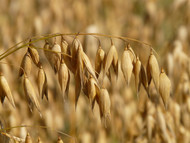Oatstanding Sustainability: Honing in on the Humble Oat
Nov 10th 2023
In recent years, oats have been seeing a massive surge in popularity, fueled by the oat milk craze and the breakfast takeover of overnight oats and steaming hot oatmeal. This blog provides a brief overview of the nutritional excellence of whole rolled oats before shifting our focus to a lesser-known aspect: They are an incredibly sustainable ingredient!
While it should come as no surprise that whole rolled oats are currently trending due to their plant-based protein content, did you know that they also feature a wide range of essential vitamins and minerals, like manganese, phosphorus, copper, biotin, vitamin B1, magnesium, chromium, iron, and zinc? They're also an excellent provider of both soluble and insoluble fiber.The main form of soluble fiber found in oats is beta-glucan, which is worth taking a moment to highlight further. According to Harvard research, beta-glucan is known for its ability to slow digestion, enhance the feeling of fullness, and reduce appetite. Regular intake of beta-glucans has been demonstrated to reduce cholesterol levels as well. This kind of fiber also "may help to prevent sharp rises in blood sugar and insulin levels after eating a meal, and may benefit gut health as the fiber is broken down and fermented by intestinal bacteria."
In addition to balancing your blood sugar, lowering your cholesterol, and being great for your gut, whole rolled oats may also alleviate skin inflammation and irritation, be good for brain health, and may provide anticancer properties. They are also "the only food source of avenanthramides, a unique group of antioxidants believed to protect against heart disease" (Healthline). (If you are interested in rigorously technical details about the health benefits of oats, we recommend visiting the National Institute of Health's review on the subject).
Oats are unquestionably a nutritional gem, but they also bring Sustainability to the table!
For farmers, oats play a pivotal role in sustainable crop rotation, serving as great examples of regenerative agriculture (Oats: Nutrition, Benefits, Downsides, & Uses (foodrevolution.org)). When integrated into crop rotations spanning multiple years, oats mitigate soil erosion and reduce the carbon footprint of farming operations. They capture nitrogen and act as natural weed-suppressing cover crops, reducing the need for synthetic herbicides. Their water-efficient nature allows them to draw moisture from the soil naturally, minimizing the need for irrigation.
The sustainable benefits of oats continue into the milling process, which produces minimal waste and the byproducts can be used for feed and fiber. One of our vendors highlights that the landfill diversion rate for oat product at their facility is 99%!Oats offer a sustainable choice for consumers as well. They are grown throughout the US so you often have the option to buy them locally. Purchasing oats close to home minimizes emissions from distribution and supports your local economy.They are frequently sold in bulk, allowing shoppers to engage in #precycling and reduce their reliance on plastic packaging.
And here's a little secret... oats have an incredible shelf life, staying fresh in your pantry for 1-2 years. In certain instances, when stored with oxygen absorbers in airtight packaging, oats can maintain their freshness for decades.So, whether you're stocking up on oats or enjoying our Plant-Based Hearty Breakfast Scone, remember that you're not just nourishing yourself. You're supporting a sustainable and eco-friendly choice that benefits the planet, local communities, and future generations!

